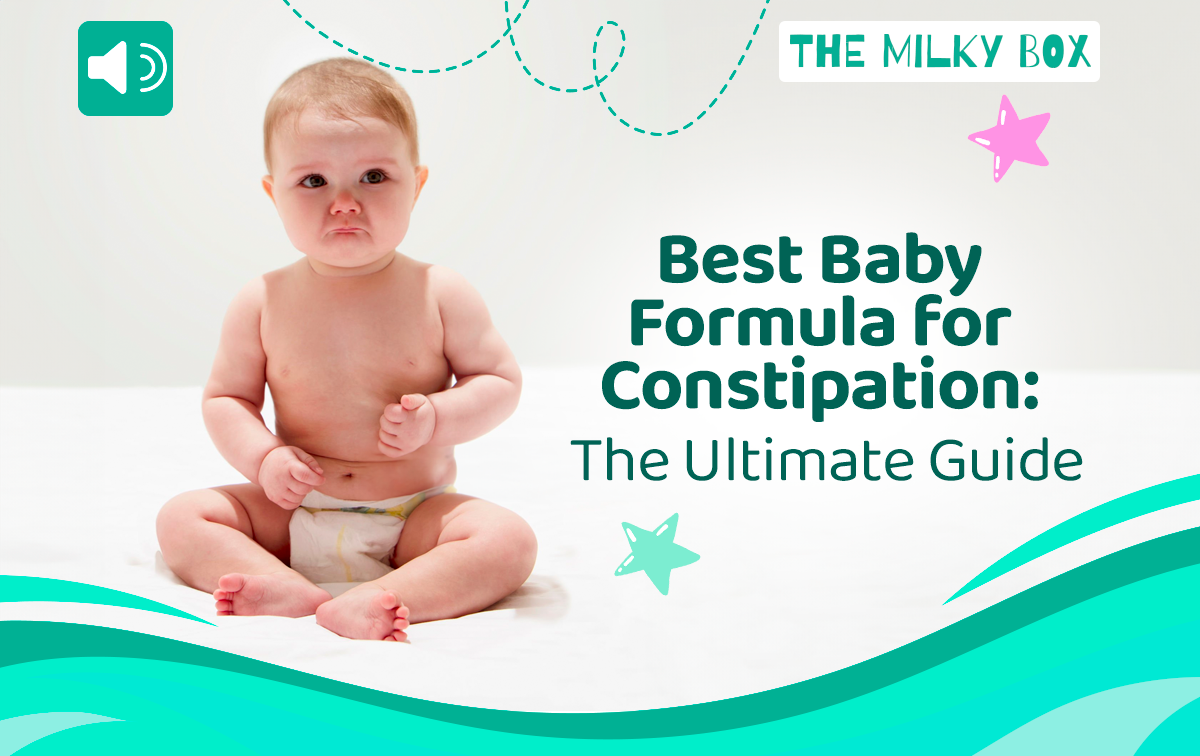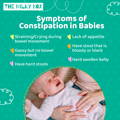Lorem ipsum dolor sit amet, consectetur adipiscing elit, sed do eiusmod tempor incididunt ut labore et dolore magna aliqua. Ut enim ad minim veniam, quis nostrud exercitation ullamco laboris nisi ut aliquip ex ea commodo consequat. Duis aute irure dolor in reprehenderit in voluptate velit esse cillum dolore eu fugiat nulla pariatur. Excepteur sint occaecat cupidatat non proident, sunt in culpa qui officia deserunt mollit anim id est laborum.
Best Baby Formula for Constipation: The Ultimate Guide
By: Suzanne Renee'- Updated December 19, 2023 - 11 Minute Read

Bowel movements that are tough or happen less often are not out of the norm but, over time, can make babies uncomfortable, gassy, and fussy. Although constipation is not usually severe, we are sure your infant will feel much better when their little systems are back on track.
In this article, we will take a look at ways to help your little one with constipation.
Table of Contents:
1. Formula-Fed Newborns and Constipation
2. Symptoms of Constipation in Babies
3. Common Issues Leading to Constipation in Formula-Fed Babies
4. Should You Switch Baby Formula to Help Your Constipated Baby
5. Why Are European Formulas Better for Your Baby’s Health?
6. Best Formula for Constipation?
8. Baby Formula for Constipation
Formula-Fed Newborns and Constipation
It is common for infants to become constipated when they begin your familes trusted baby formula, in fact, up to 30% of newborns have this trouble. Choosing nutrition that improves your baby’s digestion and offers an organic diet mimicking breast milk can help alleviate the symptoms or stop digestive distress altogether.
Symptoms of Constipation in Babies
Constipation is defined by how often your baby poops as well as how tough it is for them to pass the stool. Formula-fed babies can have soft, easy-to-pass stools as infrequently as 4-5 days without worry.
On the other hand, it may be time to talk with your pediatrician about switching baby formulas if they are experiencing more significant constipation worries.

Common Issues Leading to Constipation in Formula-Fed Babies
Babies sometimes have a slow digestive system because the baby formula is nutrient-dense to target growth and development specifically. Your little one’s system works to absorb all the protein, vitamins, and minerals, which leaves little to digest.
There are additional causes of constipation in formula-fed babies involving changes in diet, allergies, and individual digestive worries that are unique to your infant.
Change from Breastmilk
It is common for your baby to become constipated when switching to infant formula from breast milk due to the challenges of a bigger protein.
When preparing baby formula, always use the amount of powder recommended on the packaging. Using too much powder can make through off nutrients, cause dehydration, or cause constipation.
Cow's Milk Allergies
Cows' milk allergy or intolerance can cause a wide range of symptoms, including skin reactions and digestive worries such as stomachache, vomiting, colic, diarrhea, or constipation are all possible symptoms that may need a second look.
We suggest speaking directly to your qualified practitioner regarding cow’s milk allergy or intolerance for specialized care.
Dehydration
There are several reasons your baby may not get enough fluids. Dehydration can happen when infants are teething, sick (such as a cold, a throat, or ear infection), or if they are older, not drinking enough fluids with their food.
Proper fluids are needed to ease digestive functions and ensure overall health.
Lack of Fiber
In older babies, constipation can be caused by simply introducing solid nutrition or not getting enough fiber from organic fruits, vegetables, and porridges in the newly formed diet.
Should You Switch Baby Formula to Help Your Constipated Baby?
Formula-fed babies are more likely to be constipated than those exclusively breastfed. Formula is thicker than breastmilk and has larger proteins that take longer to absorb and, for some littles, can be harder to digest.
Suppose your little one has been struggling digestively for some time. In that case, we recommend talking with your qualified practitioner about a baby formula that suits your infant’s specific needs or potentially supplementing it with digestive enzymes to facilitate easier digestion.
It is worth noting that switching baby formulas too quickly and too many times can cause or make the effects of constipation worse, so take your time in choosing the perfect formula and allow a couple of weeks for gut flora to settle.
Why Are European Formulas Better for Your Baby’s Health?
The European Commission regulates the requirements and exclusions of European baby formula just as the FDA oversees US baby formula. These agencies operate similarly, but their ideas of what is considered proper nutrition for an infant could be similar.
From minor ingredient amounts to significant differences in nutritional content and adherence, the EU and FDA each have different ideals of what should be included and what should be excluded in your baby's nutrition.
Baby Formula Ingredients
Traditional American baby formulas are manufactured using cheap and processed ingredients with empty calories that give no nutritional benefits to infants. American pediatrician Dr. Lustig was noted as saying that currently available infant formulas in the United States have such high sugar contents that they are basically “baby milkshakes.”
On the other hand, European infant formulas are manufactured under strict organic farming practices without processed sugars.
Carrageenan
Despite its approved use in the US, the European Union (EU) prohibits carrageenan in all infant formula. Carrageenan used in infant formula can irritate the baby’s digestive system and result in many problems, including severe constipation.
In its 2003 review, Opinion on the Opinion on the Opinion on the , the European Commission (EC) reaffirmed its position on the use of carrageenan in infant formula. The European commission stated that it remained inadvisable to use carrageenan in infant formula that is fed from birth on for any reason, medical or not.
Organic Baby Formula
European baby formulas are produced using organic farming practices that have your infants' growth and development at the forefront, unlike the FDA, which has other interests when approving potentially worrisome nutrition.
Pure, clean natural ingredients used in the European formula can deliver nutrition that eases digestive systems and supports healthy bowel movements in your infant.
Best Formula for Constipation?
Infant digestive systems are so immature that constipation can be a real problem when exposed to most over the counter, non-organic formulas out there.
When it comes to constipation in formula-fed babies, your infant's nutrition is often the key to solving the problem.
HiPP Baby Formula
HiPP Organic Baby Formulas are specially produced with high-quality ingredients that mimic breast milk as closely as possible. HiPP promotes gut health and supports healthy bowel movements by adding prebiotics and probiotics.

Specifically designed for babies with digestive distress, including constipation, colic, and excessive gas.
✓ Contains Probiotics & Prebiotics
✓ No sugar, no corn syrup, no soy
✓ Reduced lactose with hydrolyzed milk protein
✓ Easy-to-digest formula for sensitive babies
Holle Baby Formula
Holle Organic Baby Formula is certified by Demeter Standards, which is the most significant biodynamic agriculture award and the first organic label for infant foods. Pure, clean nutrition without harmful ingredients means healthier infants.
Babies who experience discomfort, inflammation, constipation, and other digestive issues benefit from a simple switch to Holle A2 milk-based formula.
✓Pure Organic Infant Nutrition
✓No sugar, no corn syrup, no soy
✓ A2 Cow’s Milk Protein
✓ Gentle on immature digestion system

Goat Milk Baby Formula
European goat's milk infant formulas provide your little one with essential nutrients that closely match those found in breast milk. The compositional uniqueness of goat’s milk lies in elevated levels of essential vitamins and minerals, easier-to-digest milk proteins, and the natural presence of prebiotic oligosaccharides that aid in keeping constipation at bay.

Goat's Milk is a Natural Source of Essential Vitamins and Minerals
✓ Vitamin A for Vision and Sight
✓ Magnesium and Vitamin C for Development
✓ Calcium for Teeth and Bones
✓ Phosphorous for Energy Support and Absorption.
Acid Reflux Formula for Baby Constipation
Constipation can increase your child’s risk of developing reflux. When stool begins to collect and back up in a child’s intestines, it creates increased pressure in the abdominal cavity.
This excessive pressure can push on the stomach and may ultimately force the stomach contents up into the esophagus, causing reflux.
Acid Reflux Formulas
European infant formulas such as HiPP AR (Anti-Reflux) Baby Formula use organic thickening agents like locust bean flour to help settle the digestive system upset by acid reflux. However, acid reflux formulas are not recommended for baby constipation.
The formula is denser than infant formulas, which means the GI tract of the baby takes more time to process it. Using this type of cow’s milk formula leads to further constipation.
Special nutrition for infants that experience acid reflux, spit-up, or regurgitation on an ongoing basis.
✓ Hydrolyzed Protein
✓ Prebiotics & Probiotics
✓ Organic Locust Bean Flour as a Natural Thickener
✓ No sugar, no corn syrup, no soy

How to Treat Constipation at Home
Along with a possible change in your infant formulas, there are other measures you can try to help treat constipation.
Measure First
In your formula-fed baby, always ensure that you measure the water first before adding the powdered milk. This keeps the nutrients balanced, so your baby’s system is not taxed.
Water Babies
If your baby is over six months old and ready, according to your family doctor, offer water (boiled, filtered, and cooled first) outside your regular bottles.
Abdominal Massage:
To help your baby's bowels move, try a variation of a simple "I love you" massage technique.
With "I L U" in mind, start at the bottom right side of your baby's abdomen and, using small, gentle circular movements, gently rub toward the top right, forming the letter "I". Stop when you feel the rib cage.
Repeat this action, but also then move across the abdomen just above the belly button toward the baby's left side, forming an upside-down "L". Repeat this progression a third time, also moving downward toward the bottom left of the baby's abdomen to form an upside-down "U". Repeat this entire "I love you" massage pattern five to ten times.

Add Fiber 6 months
If your baby is older than six months, add some extra fruit and vegetables to their diet to boost their soluble fiber intake.
If your child is older than nine months, adding stewed organic prunes or apricots to their meal may help. They can have up to 3 tablespoons, 3 times a week.
Cereal that has bran may also help with mild constipation. Older babies can try prune juice diluted with water (half prune juice and half water). Start slowly, with 10 milliliters. Increase as needed until they can do a soft baby stool.
Anytime you make dietary changes, please consult your family caregiver to ensure your breastfed and formula-fed babies receive the appropriate nutrition for their age and developmental needs.
Tummy Time
For babies, sometimes doing more “tummy time” and “bicycle maneuvers” periodically throughout the day can help with constipation. The more your baby moves, the higher the probability that their bowels will move.
When to Call the Doctor for Baby Constipation
Constipation is common. Often, it will pass without intervention or with minor help with the best baby formula or other strategies listed above.
If you continue to worry that your breastfed baby or formula-fed baby has infant constipation that is uncomfortable or painful, it may be time to call your family doctor for additional baby-safe strategies.
In extreme cases, rare illnesses can cause infant constipation, such as problems with nerve endings in the bowel, problems relating to the spinal cord, thyroid deficiency, and other metabolic disorders.
Glycerin Suppository:
Your healthcare provider may suggest an infant glycerin suppository. Glycerin suppositories are only meant for occasional use. It is not recommended to use mineral oil, stimulant laxatives, or enemas to treat infant constipation unless specifically introduced by your qualified provider.
Baby Formula for Constipation
Finding the perfect baby formula to ease constipation is imperative to maintaining overall health and well-being. European baby formulas have the answer for your constipated baby.
The Milky Box has unique nutrition to support every baby- physically, digestively, and cognitively. Our team is here to help with your European baby formula needs.
Frequently Asked Questions
Should I Switch Formula if My Baby is Constipated?
Does Iron in Baby Formula Cause Constipation?
Be aware that switching to a low-iron formula in an effort to ease constipation isn’t recommended. Infants require iron intake for proper growth and development, and the amount in the baby formula should not cause constipation.
Does Baby Formula Cause Constipation?
In particular, when you first move from breastmilk to formula, it's not unusual for your baby to become constipated for a short time as their digestive system adjusts. Choosing a baby formula with a probiotic can help make the transition easier.
Disclaimer:
Please be aware that this information is based on general trends in babies, and it is not medical advice. Your doctor should be your first source of information and advice when considering any changes to your child’s formula and when choosing your child’s formula. Always consult your pediatrician before making any decisions about your child’s diet or if you notice any changes in your child.
Breastfeeding is the best nutrition for your baby because breast milk provides your child with all the essential nutrients they need for growth and development. Please consult your pediatrician if your child requires supplemental feeding.

Suzanne Renee' is an accomplished professional with extensive expertise in the area of infant nutrition, dedicated to promoting the health and wellbeing of children. She started this journey as a foster parent. Suzanne has emerged as a strong proponent of the European baby formula and has become a full time writer of the subject. In her free time, she enjoys camping, hiking and going to church.
Read Next:
Reviewed by Dr. Eric Wood, ND, MA

Dr. Wood is a licensed naturopathic doctor, with a doctorate degree from the Canadian College of Naturopathic Medicine in Toronto, Canada. He received his post-graduation certification in Mind Body Medicine at Harvard University.
With 15 years of experience, Dr. Wood is an Associate Professor of Holistic Nutrition at the American College of Health Sciences in Portland, Oregon. Dr. Wood is an educator, clinician, author, media figure, consultant, and owns his own holistic (naturopathic) medical practice in Ft. Lauderdale, Florida. Dr. Wood is currently researching and drafting books on cancer and pediatrics.
Outside of the medical profession, Dr. Wood loves singing with the Miami Lyric Opera and is an avid musician in South Florida. He also loves spending time with his wife and kids.

